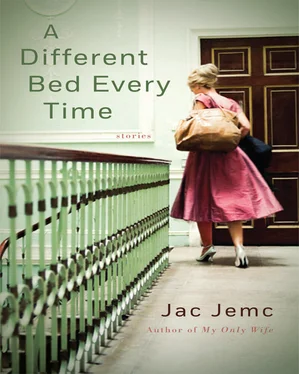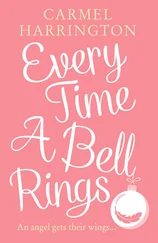All went according to plan, and I waited anxiously for the episode to air, for my agent’s calls to increase in frequency. But the episode came and went, and the phone never rang. I guess I could have kept trying, but if I wanted to, I would have, or at least that’s what a book told me.
I started to stay home, watching the old movies I’d grown up with — suspense thrillers and musicals and dramas about aging film stars being replaced by younger ones. I reached into the gap between the cushions of my couch to find change to tip delivery men. My shoulders grew weak until it was a bother to lift my arms, and before I knew it, I wasn’t raising my hands even to the height of the doorknob. Staying in was easy enough. I had residuals coming in from a corporate training video I’d done in college. I was living in a house my grandfather had left me when he passed away. My sister showed up every other week to convince her limbs around me and eye my scalp oil, unable to tell me to shower. I’d smile and tell her I was fine. “I’m happy!” I’d say and she’d gather the dirty dishes piled on every surface and heave them into the sink before donning her rubber gloves to scrub off the scum. I could feel cavities nesting in my teeth; I knew the root of one tooth was dead. The pain rang and pounded like someone wanting to be let in. I spoke pulverized truths to my sister trying to get her to relax. “I can leave whenever I feel like it” and “I just need a few minutes to be myself.” She’d give up and leave and I’d trace paused cartoons off the screen of my television for fun. The arrangement felt logical at the time.
I refused to admit my behavior was not normal. The outside world and I were like cracked magnets. We had been one and the same, but we’d broken apart and could now do nothing but resist. Every time I considered leaving my home, I wondered what could be waiting for me out there and never came up with an attractive enough answer. It wasn’t even fear. That’s what I kept telling myself.
I’d sit on my couch and try to catch the sunlight on my watch face. I’d direct the light onto my cat until she chased the slow burn of the reflection. Bugs showed up, cinching themselves through the pipes and the baseboards. My sister would appear to ask me lists of questions out of pamphlets she got at the doctor’s office. I’d test myself by trying to guess how she was diagnosing me by the questions she asked. My record was guessing bipolar from the first question. “‘I feel so restless or find it so hard to keep still that other people have pointed this out to me.’ Do you feel this way ‘Rarely,’ ‘Occasionally,’ or ‘Most of the Time’?” I said, “Penny, do I look restless? I’m not bipolar,” and she stared at me like I had pressed her into some impossible place.
When our mother died back in Tulsa later that year, I wanted to pay my respects. I booked a flight and called a cab. When I walked out my front door, there was the proof that that agoraphobia pamphlet didn’t apply. I got on a plane and tried to take the stains out of the memories of my mother. The asshole next to me kept forcing his elbows down on the armrest that my hip meat kept forcing up. Eventually he spilled a mess of words into the air at me and moved to sit across the aisle next to a child flying alone. I adjusted that armrest up and relaxed comfortably for the rest of the flight.
I examined the photos my mother had framed all along the staircase: so many of me making smiles like I was dying with forced charm before a dance recital, photos that were sixty percent ceiling, where I clutched bouquets of flowers after the high school musical. I recognized a lingering pride in my belly, and in the reflected glass of the frames, I saw an abstract smile pulling itself from my lips. I had had such hopes, but now when I thought about my ambition, I felt pity. My dream had been to excel at convincing people I was someone else. The intention felt so specific now. It felt sad and misguided. It felt better not to know what the hell I was doing than to think about where that impulse had come from at such a young age.
I thought of the bugs roaming the house back in California and how it felt good to recognize a problem.
I held it together most of that day, meeting with the undertaker and going to the florist with my sister and her family. Not until I went out to the garden and saw one of my mother’s footprints still stamped into the waterlogged mud of a flower bed did I cry. My mother had just had the yard resodded. She didn’t think she was about to die. You could see the seams stashed all over the lawn where sheet of grass met sheet of grass. I found a single weed that had wormed through the newly laid mess. “It’s okay,” I thought. “She would have found you.” And my mother would have. She was ruthless, determined to a fault. She kept after something until she forgot why she was after it. My mother thrilled every time I got another role, every time I became another option. She seemed sure I’d find someone better to be.
That night in the shower, so much of my hair washed down the drain that I worried I might disappear, but when I wiped off the fogged-up mirror, I saw my head was still full of locks and tangles. I combed it carefully and emerged in pajamas to find my brother-in-law waiting to brush his teeth. “Don’t bother,” I said. “Come with me.” His face lifted slowly and he followed me down the stairs. My sister was at the counter, flipping through my mother’s address book, making sure we hadn’t missed letting anyone know. I pulled a bottle of rye from under the counter. Surely no one had touched it since my father had passed away. I poured for all three of us and asked my sister who she thought she’d been in our mother’s eyes, and who she’d wanted to be. My sister said she’d never thought of it that way, and I said, “Let’s.”
As often is the case, the situation was nearly impossible to recognize as an ending. Each tried to rehash the circumstances again and again to his or her own advantage. When even every unintended chance had been given to and misused by Benji and Pippa, they knew it must be over. When they were able to see it, when the sunlight finally hit the surface of it in a way that they recognized the crack for what it was, the decision was clean and obvious and certainly a relief. For so long they had both been sure of each other, they knew this break had to be even and sharp in a way that no one could get sentimental or nostalgic.
They owned a good deal of stuff. Neither could recall who purchased what, so lost in each other had they once been, but suddenly King Solomon was remembered by Pippa, and Benji concurred that everything needed to be destroyed. It would be the only way — break it all down and hurl it into large dumpsters.
Cutting tools were purchased by Benji — this was clear— Benji now owned the destruction equipment . Diagonal slashes were dragged through every object. They started at the sternum of their home, tearing through books with thick scissor blades. The large chainsaw broke through the center of the couch easily, sending cotton and carcinogenic foam rubber into the air. Pippa went back to the hardware store and purchased bird flu masks. Benji refused one at first, but Pippa expressed her concern — she didn’t want the guilt of his slow death to rest on the end of this relationship. He accepted and then perspiration grew around their mouths in equally salty increments.
Pippa sat looking at a necklace Benji had given her and suddenly, metal to metal, wire cutters severed the links into two strands. “Everything,” Benji said. Anger and agreement drove Pippa’s hands into the shoebox beside her and pulled up a stack of photos, her fingers destroying them in one clean pull of corner from corner. Benji smiled at her, but Pippa couldn’t see it under the paper mask. Benji used the CutCo knives to saw through cans of soup and then bent the knives until the blades snapped. Pippa tore through every precious dress she’d sniffed out in thrift stores and sample sales. Benji unplugged the TV before trying the saw on it first and then resorting to the sledgehammer. He didn’t pause as he slid each baseball card out of its plastic sheet. Pippa kicked through framed drawings she’d made of Benji. Let’s be clear: they meant every word.
Читать дальше












